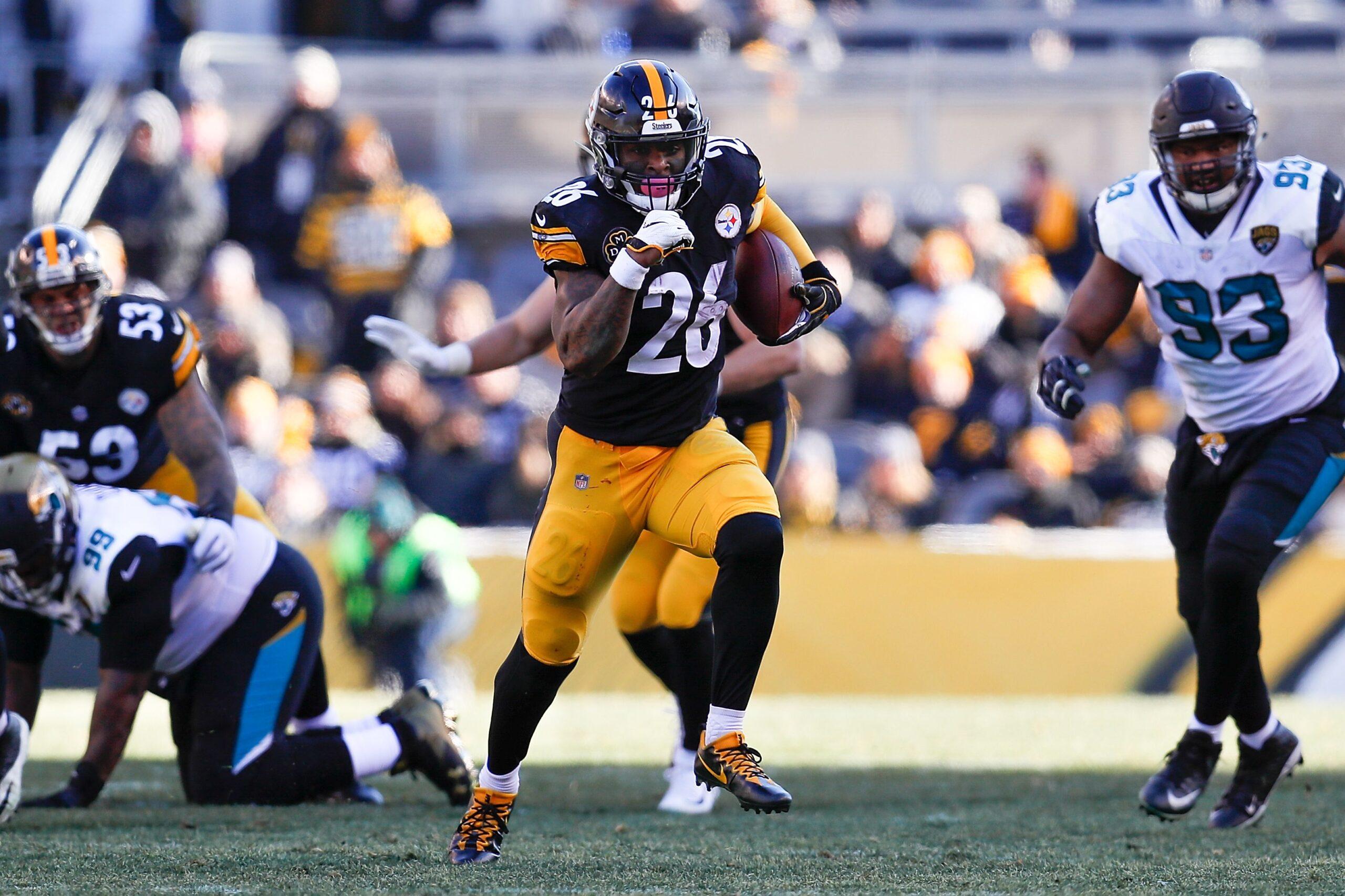
Steelers running back Le’Veon Bell is about to embark on the least popular holdout in recent NFL memory. For the second season in a row, the Steelers have stuck Bell with the franchise tag—guaranteeing him the top running back salary in the league ($14.5 million), but giving him no long-term assurances. And for the second season in a row, Bell opted not to show up for training camp or preseason games. Last year he returned for the games that count, but this time he’s taking things a step further. On Wednesday, his agent suggested that his holdout will continue into the regular season, a move that surprised fans, coaches, and teammates alike.
It is not hard to conjure up reasons to be against Bell’s holdout. Here is a list of four:
1. Normally, players unite around the contract demands of their teammates. News of Odell Beckham Jr.’s recent contract extension set off a party in the Giants’ locker room. Same with Aaron Donald’s new deal, although with less dancing. When one player wins a salary dispute with management, it increases every player’s leverage in the future.
Except, apparently, with the Steelers, who have been unusually critical of Bell’s demands for a long-term deal. According to ESPN’s Jeremy Fowler, one veteran player simply commented on the situation: “He fucked us.” Pittsburgh’s offensive line—the guys who block for Bell—were particularly harsh. “He’s making seven times what I make … and we’re the guys who do [the work] for him,” left guard Ramon Foster said. “In the ultimate team sport, we’ve created a league of individuals.”
Foster is the Steelers’ union representative! He’s the guy who is supposed to understand that a player holding out for individual pay can increase the collective willingness of owners to pay all players! And even he’s trashing Bell. Foster contrasted Bell’s holdout with the fact that he came to practice the day after his mom’s funeral, and that left tackle Alejandro Villanueva, a former Army Ranger, “has seen people die and has come and given his all to this team.” That’s right, folks: Holding out disrespects the troops.
The public often sides against players during holdouts, perceiving them as ungrateful in asking for more when they already make millions playing a game. This, of course, ignores that the alternative is the money going to even wealthier owners who don’t lift a finger while collecting much larger paychecks than any player. Pittsburgh’s offensive line uniting against Bell will especially reinforce the public’s anti-holdout stance. Bell doesn’t seem like a worker when the all-guts, no-glory guys who open holes for him think he’s a prima donna. (The Steelers really need a new union rep.)
2. Bell’s backup, James Conner, is probably the most popular second-string running back in the league. Conner is one of a handful of players who plays in the same NFL city where he played college football, and is almost certainly the most prominent. At Pitt, Conner was a 2014 All-American and the ACC Player of the Year. But his story really took hold after that season, when he was diagnosed with Hodgkin’s lymphoma. He began chemotherapy in 2015, then became a local icon by beating the disease and returning to play for the Panthers in 2016. When the Steelers selected Conner in the third round of the 2017 draft, his jersey instantly became one of the best sellers not just among rookies, but in the entire league.
Every week that Bell holds out this season is another week that the Steelers will start a hometown hero cancer survivor at running back. Pittsburgh will cherish each one.
3. Bell’s holdout impacts the hopes of the Steelers. On one hand, even Bell supporters likely understand that Pittsburgh can win the AFC North without him. It went 13-3 last season, plays in a division lacking other real contenders, and features a passing game (headlined by Ben Roethlisberger, Antonio Brown, and JuJu Smith-Schuster) that finished just 51 yards shy of the league lead in 2017. The Steelers went 7-3 in games without Bell in 2015 (averaging 31.9 points per game without him, more than their average of 17.3 with him) and 4-2 in games without Bell in 2016 (averaging 25.6 points per game without him, more than their average of 23.0 with him.) On the other hand, even the most casual fans acknowledge that Bell can lift this offense to another level.
Pittsburgh fans are, suffice to say, not on Bell’s side.
And it’s not just people in Pittsburgh who are mad at Bell. Think about the actual reason that many Americans watch football: our damn fantasy teams. Bell was universally regarded as one of the top two players in fantasy football entering this season. Literally millions of people invested in him, in the form of a top-two pick or roughly 40 percent of their draft auction budget. I’ve seen fantasy owners get furious at athletes for having the gall to suffer catastrophic injuries—how mad are y’all gonna get when your team’s top overall draft pick takes half the year off because he wants more money? Doesn’t he know that we want money, too? It’s one thing to anger fans of one of the NFL’s 32 teams; Bell angered about 10 percent of the tens of millions of fantasy football players nationwide.
Almost nobody will be on Bell’s side in this. In an era when the average NFL running back makes less than the average NFL kicker, his decision to hold out seems misguided. But perhaps the wild unpopularity of Bell’s decision can reinforce how valuable he is as a player.

Let’s say the Steelers do, at some point, choose to renegotiate with Bell and give him a long-term contract. It will not be to keep the fans happy; it will not be to keep his teammates happy; it will not be to help your fantasy team. It will be because the front office knows that Bell adds a critical dimension to the team’s offense that could help it contend. While running the ball in the NFL doesn’t matter as much as it once did, running backs who contribute in the passing game have taken on increased importance. And Bell is one of the best pass-catching backs in the league; last season he finished top-10 in receptions (85, three behind Julio Jones) and was third on the team in receiving yards (655). Bell has more than 3,800 yards from scrimmage during the past two seasons. By comparison, Todd Gurley—the Rams star running back who just got a four-year, $60 million extension with $45 million guaranteed—has 3,305 yards from scrimmage through that span. Conner, meanwhile, had just 30 receptions in four years of college ball, and none as an NFL rookie.
Bell is dynamic. The Steelers might be good without him, but they have their best chance of challenging for the Super Bowl with him. They have the money to pay him—they currently have $23.9 million available in 2019 cap space, and in the long term are only committed to an aging Roethlisberger for one more season. They face a choice whether to be stingy or give the team its best chance of winning another title while Roethlisberger is active.
If the past week is any indication, though, the idea of Bell and Pittsburgh coming to terms on a contract seems unlikely. The more probable outcome is that the Steelers don’t reup him and he reports to the team before Week 11. (If he doesn’t show up for at least six games, he will not be allowed to become a free agent next year.) In this regard, Bell is gambling with real money. He will not be paid during his holdout. Every week that he sits, he’ll lose almost a million dollars.
But it’s a bet that might pay off. Bell carried the ball 321 times last season, leading the league by 34 for an average of more than two per game. Add in Bell’s receptions, and he became just the second player this decade to rack up 400 touches in a single campaign. The last guy to do it, DeMarco Murray, was never the same again. The former Cowboys star is retired four years after his 400-touch season. There are a limited number of carries in a running back’s body. And on top of that, each week brings the risk of catastrophic injury that could immediately end a career.
Bell might be losing a million dollars a week, but each week he sits increases the likelihood that he will make it to free agency healthy, and every carry he avoids ups his chances of extending his earnings into future contracts. Running backs have short, brutish careers. For this reason, most of them aren’t particularly valuable. But the few that are, like Bell, should not agree to take on massive workloads under the franchise tag.
Bell’s holdout might be massively unpopular. James Conner will get his day in the sun; the Steelers’ offensive line will be lionized; anti-Bell memes will be made. That doesn’t mean Bell is making the wrong move.